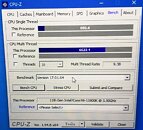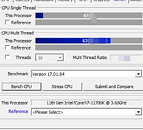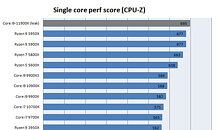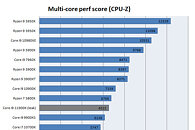Thursday, December 31st 2020

Intel Core i9-11900K CPU-Z Benchmark Score Leaks
Intel is preparing to launch their latest generation Rocket Lake-S processors in the coming weeks. We recently saw some leaked Geekbench 5 scores for the eight-core Intel Core i7-11700K showing it beating the AMD Ryzen 9 5950X in single-core performance. We have recently received some new benchmarks for the i9-11900K and i7-11700K this time in CPU-Z showing them once again best AMD in single-core performance.
The Cypress Cove core design found in these upcoming processors is expected to bring double-digit IPC gains over Skylake and this is reflected in these scores. Take all these benchmarks with a healthy dose of skepticism as we have no way of confirming these numbers until we can test the chips ourselves. The Intel Core i9-11900K gets a single thread score of 695.4 and a multi-thread score of 6522.1 which puts it 19% ahead of the i9-10900K and 3% ahead of the AMD Ryzen 9 5950X in single-threaded performance. The processor still falls far behind the Ryzen 9 5950X in multi-threaded performance due to it having half the number of cores.The Intel Core i7-11700K CPU-Z benchmark results were also leaked however the photo has been edited to hide the exact score. The i7-11700K scores 67X in single-threaded performance, and 63XX in multi-threaded performance. This puts it 18% ahead of the i7-10700K and close to or slightly below the Ryzen 9 5950X in single-core performance.
Sources:
@9550pro, @OneRaichu, VideoCardz, guru3D
The Cypress Cove core design found in these upcoming processors is expected to bring double-digit IPC gains over Skylake and this is reflected in these scores. Take all these benchmarks with a healthy dose of skepticism as we have no way of confirming these numbers until we can test the chips ourselves. The Intel Core i9-11900K gets a single thread score of 695.4 and a multi-thread score of 6522.1 which puts it 19% ahead of the i9-10900K and 3% ahead of the AMD Ryzen 9 5950X in single-threaded performance. The processor still falls far behind the Ryzen 9 5950X in multi-threaded performance due to it having half the number of cores.The Intel Core i7-11700K CPU-Z benchmark results were also leaked however the photo has been edited to hide the exact score. The i7-11700K scores 67X in single-threaded performance, and 63XX in multi-threaded performance. This puts it 18% ahead of the i7-10700K and close to or slightly below the Ryzen 9 5950X in single-core performance.




184 Comments on Intel Core i9-11900K CPU-Z Benchmark Score Leaks
Will hold further judgement until we see the performance per watt(where Intel has historically lagged far behind AMD) and MSRP.
If the 11900k is priced above the 5800x, at or near the 5900x's price, it won't even be worth considering in most use cases(assuming 5800x & 5900x are in stock).
Here is the problem: you have to pay again 550 Bucks for this i9 with only 8 cores. At the end of the year you will see Alderlake (new socket1700, new DDR5, maybe PCI-E 5.0).
- As an SKU, performance should end up close to 5800X. With a full node disadvantage, power is a problem and pretty certainly that is why multi-core result falls behind. We will have to wait and see what the power consumption will look like but no doubt it will be higher compared to 5800X. Price is up to Intel, they are in disadvantage and should price it lower. On the other hand it is Intel so...
- Architecturally and from "IPC" perspective 3% ahead on a presumably 6% faster clock speed puts it close enough to Zen3. Rocket Lake's Cypress Cove is basically straight Sunny Cove backport. Willow Cove in Tiger Lake adds more cache and some optimizations around that. This puts Intel's architectural state on par with AMD.
One thing the 5800X is not is a highly binned CPU.
We'll just have to wait and see ...
It's good to see competition out there and this is how it should be, one pushing the other in a tight race for the crown instead of a one-sided affair as it had been before.
DDR5 will be on both side tho, and so far AMD tend to use ram speed better than Intel does. unless intel changes something significant in their next architecture.
The mainstream segment will be heating up with good products from both camps, and 6- and 8-core models is where most PC builders should be looking anyway. Those who have real workloads scaling beyond 8 cores generally also benefit from more memory channels, more PCIe lanes, sometimes even ECC, etc. I wish the next round of Threadrippers would start at 12 cores, not 24.
Yap they need decrease cores becouse nuclear reactor need fc 360AIO ...
Intel have long been great in single-core benchmarks by simply turning the power consumption up to 11 and flaying the absolute snot out of one core. For a game where typically 2-3 threads are in heavy use, and all cores are awake to run background threads you're going to need an all-core overclock and some insane cooling to get your 5.3GHz.
Rocket lake finally brings the 'Cove' architecture gains to desktop but still doesn't fix the boost/base clock disparity nor the massive power consumption spikes that go hand in hand with a 250W PL2 limit to achieve such madness.AMD blew it with 5600X pricing is past tense, and you're comparing it to a future tense hypothetical processor that doesn't yet have a launch date, final specs, or price?
How did you work that one out? As far as I see it, the 5600X is priced against intel 10th Gen and it's sweeping the floor with them.
If you somehow believe that there won't be an AMD answer to Intel's 11400F when it hits the market, then you need to take off your Intel-branded spectacles. AMD and Intel price things as high as they can get away with because they're in the business of making profit first and foremost. If the 11400F is a great gaming CPU for budget gamers, then that's great news but don't expect it to sit far outside the price/performance curve that both AMD and Intel use to extract the maximum profit from each model. Chances are high that AMD will release a vanilla R5 5600 at that point, probably close to the $200 price point, but subject to change based on Intel's pricing of the 11th-gen i5 models.
What Intel keeps doing is mess with power limits to not throttle multi-core performance too much.
Rocket Lake is limited by 14nm+++ and won't go any bigger than 8C for manufacturing (and power consumption) reasons, whilst the successor will be Alder Lake which I believe stops at 8 "cove" cores and fills up the multi-threaded performance with Atom cores instead.